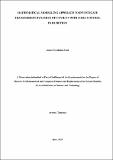Mathematical modelling approach to investigate transmission dynamics of covid-19 with some control parameters
Abstract
COVID-19 is a world pandemic that has affected and continues to affect human lives, socially
and economically. Worldwide governments enforced preventive measures aimed at reducing the
disease transmission due to its social and economic impact. Examples of such measures are phys ical separation, quarantine, hand-washing, travel bans and border restrictions, lockdown, and the
use of hand sanitizers. Some of the control measures like quarantine was the most stressful strat egy for people to manage. To examine the impact of stress on the transmission of COVID-19,
this dissertation developed a mathematical model with six compartments; Susceptible-Exposed Quarantine-Infectious-Hospitalized-Recovered (SEQIHR). The model was then analyzed both
theoretically and numerically. In theoretical analysis, terms like positivity, bounded region, exis tence, uniqueness of the solution, model existence of free and endemic equilibrium points, local
and global stability are all utilized. The basic reproduction number (R0) was calculated using the
next-generation matrix approach. When R0 < 1, the disease-free equilibrium is globally asymp totically stable, whereas when R0 > 1, the endemic equilibrium is globally asymptotically stable.
The Partial Rank Correlation Coefficient (PRCC) was used to evaluate the relationship between
model parameters and R0. The model was numerically solved using the fourth-order Runge-Kutta
method, and parameter identifiability was achieved using least square and Markov Chain Monte
Carlo (MCMC) methods. The formulated deterministic model explored the impact of stress in
quarantine to the human population and revealed that when an individual’s mental health is good,
the body immunity becomes strong. Conclusively, the control parameters have a considerable
impact on COVID-19 transmission minimization.

